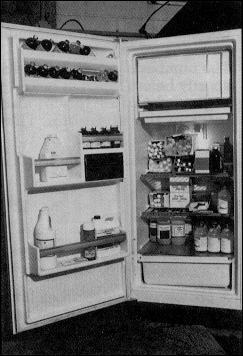Correct storage and handling of livestock medicines helps prevent contamination of meat and milk with drug residues.
Proper storage facilities improve medication effectiveness and reduce treatment errors. The ideal location for a storage unit is a clean, dry, frost-free area, such as a farm office or utility room. Animal health products should be protected from changes in temperature, sunlight, dust, moisture, animals, and insects. A clean, organized refrigerator makes an ideal drug storage unit.
An example of products affected by incorrect storage temperature are teat dips containing the disinfectant chlorhexidine. These may irritate skin if used after freezing and thawing has occurred.
Vaccines containing modified live organisms will have markedly reduced effectiveness if stored at room temperature.
Most antibiotics are heat sensitive. Store these products in a refrigerator at a temperature between 2° and 8° C. to maintain potency. Many other products require storage in a cool (below 15° C.) but non-refrigerated location. Check product labels for information on acceptable storage temperature.
Product decomposition may result from exposure to light. Manufacturers package light-sensitive products (e.g. injectable tetracyclines) in light-resistant containers. These should be kept in a light-proof storage unit.
Different classes of products (e.g. antibiotics, vaccines, dewormers, etc.) should be stored on separate shelves. This will further reduce the potential for error in product selection. Label shelves to maintain an organized storage unit.
Lock storage units to prevent access by children or unauthorized individuals.
Inventory managementThe on-farm veterinary medicine inventory should be managed according to the following procedures:
Safe disposal of livestock medicines is essential to protect farm employees, family members, untreated livestock, and the environment from accidental exposure to potentially hazardous chemicals.
Many veterinarians and manufacturers will accept returns of products at the location of purchase. In some municipalities, medicines can be disposed of on "Household Hazardous Waste Days."
Animal pesticides (e.g. dewormers, louse control products, etc.) must be disposed of in an identical manner to crop pesticides.
Never reuse livestock medicine containers. Store containers for discarding in a way which prevents access by children, livestock and pets. Most washed containers (with the exception of pesticide containers) may be disposed of in landfill sites. Check with your municipality.
More information availableProper storage and handling of veterinary medicines ensures drug effectiveness and reduces potential for treatment error.
Consult your veterinarian about preventive animal health management and proper use of livestock medicines. Other excellent sources of information on these subjects include local offices of the Ontario Ministry of Agriculture and Food, and the Canadian Animal Health Institute in Guelph.

A clean, organized refrigerator in a frost-free location makes an excellent storage unit for livestock medicines.
Photo credit:- OMAF photo.
Information in the above article was derived from the OMAF Factsheet, "Storage and Handling of Livestock Medicines on the Dairy Farm."
Farm Safety Association Home Page
Disclaimer and Reproduction Information: Information in NASD does not represent NIOSH policy. Information included in NASD appears by permission of the author and/or copyright holder. More